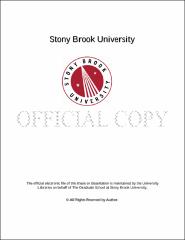| dc.identifier.uri | http://hdl.handle.net/11401/77527 | |
| dc.description.sponsorship | This work is sponsored by the Stony Brook University Graduate School in compliance with the requirements for completion of degree. | en_US |
| dc.format | Monograph | |
| dc.format.medium | Electronic Resource | en_US |
| dc.language.iso | en_US | |
| dc.publisher | The Graduate School, Stony Brook University: Stony Brook, NY. | |
| dc.type | Dissertation | |
| dcterms.abstract | Often considered the earliest autobiography written in English, The Book of Margery Kempe expresses social and religious commentary. This dissertation discusses Kempe’s life story as it mirrors the religious and social changes occurring in late-medieval England. I view Margery Kempe as a real person who was very involved in the production of her book, that the scribes who assisted her played an important part in shaping the text, but that we mainly hear Kempe’s voice. My view is that the work is neither a straightforward presentation of lived experience nor pure fiction, but based upon the real-life experiences of an atypical woman of the time. A contemporary of Chaucer and Langland, Margery Kempe details late-medieval life on the verge of change. People were building cathedrals, monasteries, and cloisters. They were adopting new ways of devotion including a devotion to a human Christ, the Eucharist, Mary and the Saints. New forms of religious piety emerged as books were imported, along with the creation of religious art. There are new ways of fasting, and new characteristics of domestic life. Kempe writes about her lived experiences in the midst of all these changes, often anticipating the changing times in England. Written at a time when literature shows little or no character development, The Book of Margery Kempe reflects how Kempe develops to attain a certain degree of self-awareness. By the end of her book, Kempe becomes an example of active piety for others. She speaks for contemporary lay men and women who were seeking to validate their lives against dominant religious norms. Kempe demonstrates, through her autobiography, that it is not necessary to follow traditional religion in order to achieve holiness. She rarely relies on the advice of clergy even though she occasionally meets with them for guidance. Kempe follows her own advice which she reports as coming from God speaking to her directly. | |
| dcterms.abstract | Often considered the earliest autobiography written in English, The Book of Margery Kempe expresses social and religious commentary. This dissertation discusses Kempe’s life story as it mirrors the religious and social changes occurring in late-medieval England. I view Margery Kempe as a real person who was very involved in the production of her book, that the scribes who assisted her played an important part in shaping the text, but that we mainly hear Kempe’s voice. My view is that the work is neither a straightforward presentation of lived experience nor pure fiction, but based upon the real-life experiences of an atypical woman of the time. A contemporary of Chaucer and Langland, Margery Kempe details late-medieval life on the verge of change. People were building cathedrals, monasteries, and cloisters. They were adopting new ways of devotion including a devotion to a human Christ, the Eucharist, Mary and the Saints. New forms of religious piety emerged as books were imported, along with the creation of religious art. There are new ways of fasting, and new characteristics of domestic life. Kempe writes about her lived experiences in the midst of all these changes, often anticipating the changing times in England. Written at a time when literature shows little or no character development, The Book of Margery Kempe reflects how Kempe develops to attain a certain degree of self-awareness. By the end of her book, Kempe becomes an example of active piety for others. She speaks for contemporary lay men and women who were seeking to validate their lives against dominant religious norms. Kempe demonstrates, through her autobiography, that it is not necessary to follow traditional religion in order to achieve holiness. She rarely relies on the advice of clergy even though she occasionally meets with them for guidance. Kempe follows her own advice which she reports as coming from God speaking to her directly. | |
| dcterms.available | 2017-09-20T16:52:52Z | |
| dcterms.contributor | Belanoff, Patricia | en_US |
| dcterms.contributor | Videbaek, Bente | en_US |
| dcterms.contributor | Boecherer, Michael. | en_US |
| dcterms.contributor | Huffman, Clifford | en_US |
| dcterms.creator | Tuthill, Janet | |
| dcterms.dateAccepted | 2017-09-20T16:52:52Z | |
| dcterms.dateSubmitted | 2017-09-20T16:52:52Z | |
| dcterms.description | Department of English | en_US |
| dcterms.extent | 119 pg. | en_US |
| dcterms.format | Application/PDF | en_US |
| dcterms.format | Monograph | |
| dcterms.identifier | http://hdl.handle.net/11401/77527 | |
| dcterms.issued | 2016-12-01 | |
| dcterms.language | en_US | |
| dcterms.provenance | Made available in DSpace on 2017-09-20T16:52:52Z (GMT). No. of bitstreams: 1
Tuthill_grad.sunysb_0771E_12764.pdf: 872033 bytes, checksum: f4d9ace8b6e21083daba3c5175832a7f (MD5)
Previous issue date: 1 | en |
| dcterms.publisher | The Graduate School, Stony Brook University: Stony Brook, NY. | |
| dcterms.subject | English literature | |
| dcterms.subject | Margery Kempe | |
| dcterms.title | Margery Kempe: A Mirror of Change in Late-Medieval England | |
| dcterms.type | Dissertation | |

